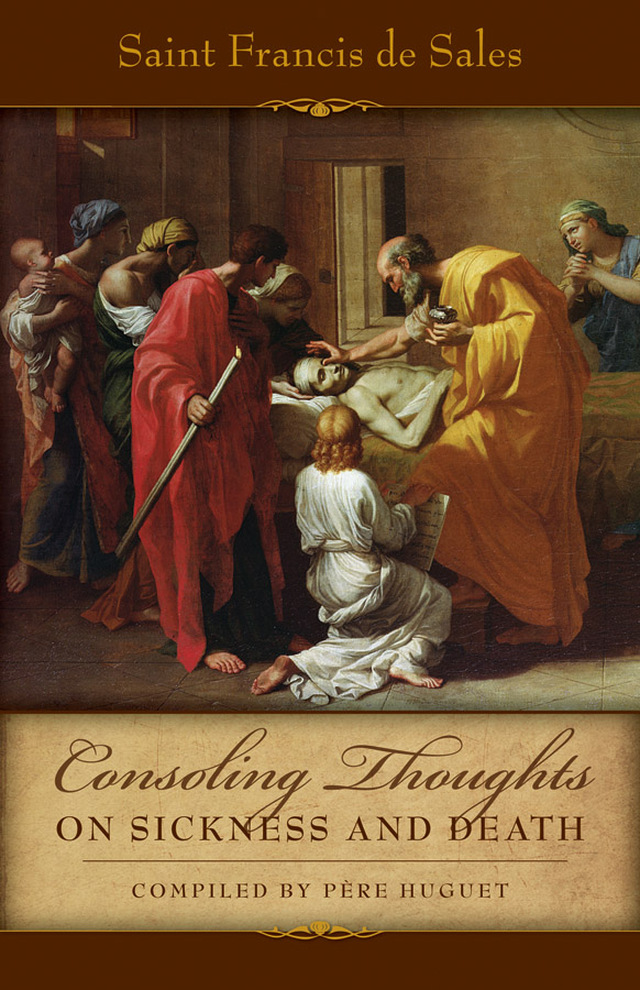Among the praises given by the saints to Abraham, St. Paul mentions this above every other, that he believed, hoping against all hope. God has promised to multiply his posterity as the stars of heaven, and as the sand of the seashore; and, notwithstanding, gave him an order to sacrifice his only son. Yet Abraham did not lose hope, but believed that while obeying the commandment to immolate his son, God would not fail to keep His word.
Great indeed was his hope; for he saw nothing on which to rely, except the word of God. Oh, how true and solid a foundation is this word, for it is infallible!
Abraham proceeded then with extraordinary simplicity to fulfill the directions of God; for he made no more hesitation to reply than when God had told him to quit his country and his father’s house. Walking three days and three nights with his son, not knowing precisely whither he went, carrying the wood of sacrifice, his son asked him where was the holocaust, to which he replied: “My son, the Lord will provide it.”
O my God! How happy we should be, if we could accustom ourselves to make answer to our hearts, when they are in fretfulness about anything: Our Lord will provide for it, and then to have no more anxiety or trouble than Isaac! For he was silent afterwards, believing that the Lord would provide what was necessary, as his father had told him.
Great indeed is the confidence which God requires we should have in His paternal care in His holy Providence; but why should we not have it, seeing that no person was ever deceived therein, and no one confides in God without reaping the fruits of his confidence?
Consider what Our Lord says to His Apostles, to establish them in this holy and loving confidence: “When I sent you into the world without purse, without silver, without any provision, was anything wanting to you?” They say: “No. Go.” He says to them, “And be not solicitous for what you shall eat, or what you shall drink, or how you shall be clothed, or how you shall speak when brought before magistrates; for, on every occasion, My Father who is in Heaven, will give you that which is necessary.”
“But I am so little spiritual,” someone will say. “I do not know how to treat with the great, I have no knowledge.” It is all one; go, and confide in God, for He says, “Though a mother should forget her child, yet will not I forget you; for, I bear you engraven on My heart, and on My hands.”
Think you that He who is careful to provide nourishment for the birds of the air and the beasts of the field, that neither sow nor reap, will fail to provide all that is necessary for those who fully trust in His Providence, and who are capable of being forever united with Him, who is the sovereign good?
We ought to know that to leave oneself, is nothing else than to quit one’s own will, in order to give it to God; for ourselves to the divine goodness: to act otherwise, would be to imitate those philosophers who made admirable abandonments of all things and of themselves, but only under some vain pretense of philosophy. Witness Epictetus, who, being a slave by condition, and his master wishing to set him free on account of his great wisdom, would not accept his liberty, one of the greatest blessings, but remained as he was in slavery, so poor, that at his death he left only a lamp, which sold exceedingly dear, having belonged to so great a man.
As for us, let us not seek to abandon ourselves, unless to leave ourselves at the disposal of the will of God. There are many, who say to Our Lord: “I give myself entirely to Thee, without any reserve”; but there are few who embrace the practice of this renunciation, which is nothing else than a perfect submission in receiving all kinds of events, according as they happen, by the order of God’s Providence, as well affliction as consolation, sickness as health, poverty as riches, contempt a honor, opprobrium as glory.
I speak of the superior part of the soul; for there is not doubt but that the inferior part, the natural inclination, tends always more to the side of honor than to that of contempt, to the side of riches rather than to that of poverty, although no one is ignorant that contempt and poverty are more agreeable to God than honor and abundance.
Let us live as long as God pleases in this valley of tears, with an entire submission to His holy will. I considered the other day what authors write concerning halcyons, little birds that poise on the roadstead of the sea. It is, that they make their nests round, and so closely pressed together, that the water cannot at all penetrate them, and there is only one little hole in the top by which they can breathe. Within they lodge their little ones, so that the sea surprising them, they float securely on the surface of the waves, without being filled or submerged, and the air entering by the little hole serves so nicely to balance these little chicklings and their little skiffs that they are never capsized.
Oh! How I desire that our hearts should be thus closely pressed together, every chink stopped up, so that if the torments and tempests of the world seize upon them, they may not penetrate them, and that there should be only one opening, on the side of Heaven, by which to breathe to our Saviour! And this nest: for what should it serve? For the little fledglings of its Maker, for divine and celestial affections.
But while the halcyons are building their nests, and their little ones are yet too tender to endure the shocks of the billows, ah! God has care of them, and looks down on them with pity, preventing the sea from overturning and destroying them. O God! This sovereign goodness will also secure the nest of our hearts, on account of its holy love, against all the assaults of the world, or will preserve us from being assailed by them.
Ah, how much I love those birds, which are surrounded by water, live on the air, and see only heaven! They swim like fishes, and sing like birds; and that which pleases me most is, that their anchor is cast on the upper side, and not on the lower, to steady them against the waves. May the sweet Jesus vouchsafe to form us so, that though environed by the world and the flesh, we may live by the spirit; that, in the midst of the vanities of the world, we may always look to Heaven; that, dwelling amongst men, we may associate with angels; and that the foundation of our hopes may be on high in Paradise.
Let holy love be always and everywhere our chief love. Alas, when will it consume our life, and make us dire to ourselves, to live only to our Saviour? To Him alone belong honor, glory, and benediction forever! Since our inviolable purpose, and invariable resolution, tends continually to the love of God, never are words of the love of God out of place.
I shall say nothing further to you, either on the great abandonment of ourselves and of all things to God, or on the departure from our country and the house of our parents. No, I do not wish to speak of them. May God be pleased to enlighten us, and to show us His good pleasure; for at the risk of all that is in us, we shall follow Him into whatever place He leads us. Oh, how good it is to be with Him, no matter where!
This article is taken from a chapter in Consoling Thoughts on Sickness and Death by St. Francis de Sales which is published by TAN Books.








